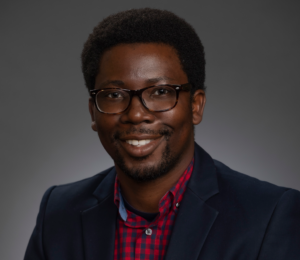PRAIRIE VIEW, Texas (January 10, 2023) — Dr. Ayodeji Iyanda, assistant professor of geography and Director of Geospatial and Health Research (GSHR) Lab at Prairie View A&M University (PVAMU), was awarded $333,020 by the Department of Health and Human Services (HHS) for his project, “Investigating the combined impact of spatial social networks and environmental exposure on minority youths’ mental health in the context of COVID-19.”
Dr. Iyanda and his team are excited about the opportunity this funding provides PVAMU students’ involvement in research focused projects.
“This wouldn’t have been possible if not for the hard work of my team,” said Iydana. “My team and I put so much effort into writing the grant by ensuring our objectives align with the vision of the grant provider.”
The collaborative project includes a co-principal investigator from the PVAMU Psychology Department, Temilola Salami, Ph.D., associate professor of clinical psychology. Additionally, Dr. Iyanda will work with several other departments at PVAMU, as well as researchers and labs at Texas A&M University (TAMU), Dr. Xinyue Ye and Dr. Dongying Li; and, University of Arkansas (UARK), Dr. Huang Xiao.
“This grant gives PVAMU the opportunity to be more competitive with other research-based universities,” said PVAMU Vice President of Research & Innovation Magesh Rajan, Ph.D., P.E., MBA. “Dr. Iyanda’s project will benefit PVAMU students as they are part of the research from the onset — giving them hands-on experience working with the investigators. It’s these sorts of opportunities that will continue to bolster PVAMUs presence in the research space.”
The project aims to examine how location affects psychological health and access to care. Symptoms of mental health have increasingly become a concern and a public health matter that must be addressed using nonconventional strategies. Poor households and government and nongovernment organizations spend a lot of money on mental health care. These monies spent on mental health could be channeled into other profitable things, helping households achieve a better life. Reducing the mental health burden in our communities is very important to the quality of life.
Constant interaction with green or blue spaces is naturally therapeutic. Providing substantial evidence through empirical research will help foster urban planning and public health policies that can improve people’s health and well-being. This research will identify areas where minority youths lack access to mental health services, which is one of the Centers for Medicare and Medicaid Services (CMS) missions.
“The funding is about revealing disparities,” said, Dr. Iyanda. “We want to understand how people’s spatial social networks combined with environmental exposure could impact their mental health.”
As the principal investigator on this project, Dr. Iyanda responsibility includes directing the overall operation of the project. Dr. Iyanda will also recruit, train, and supervise students for the project. The recruited student will work directly on the project analyzing the data toward a master’s thesis under the supervision of Dr. Iyanda.
Dr. Iyanda and his collaborators plan to recruit students who are interested in health research from social sciences (Psychology, Humans Sciences) and even computer science will be recruited in addition to a postdoctoral student.
“Personally, the grant from the Department of Health and Human Services Office of Minority Health is a great match for my research interest in revealing health disparities, particularly among minority groups,” said Iyanda. “The grant also shows the changing research landscape for the University as an R2 institution. Research grants like this will allow investigators from historically marginalized institutions like PVAMU to showcase the unexploited talents we got through research. We cannot be productive like other institutions without funding supports from both private and public funding agencies. Grants like this boost our confidence to do more transformative research regarding health policies.”
###
By Jenna Craig

